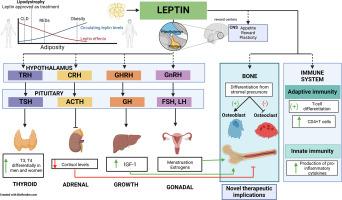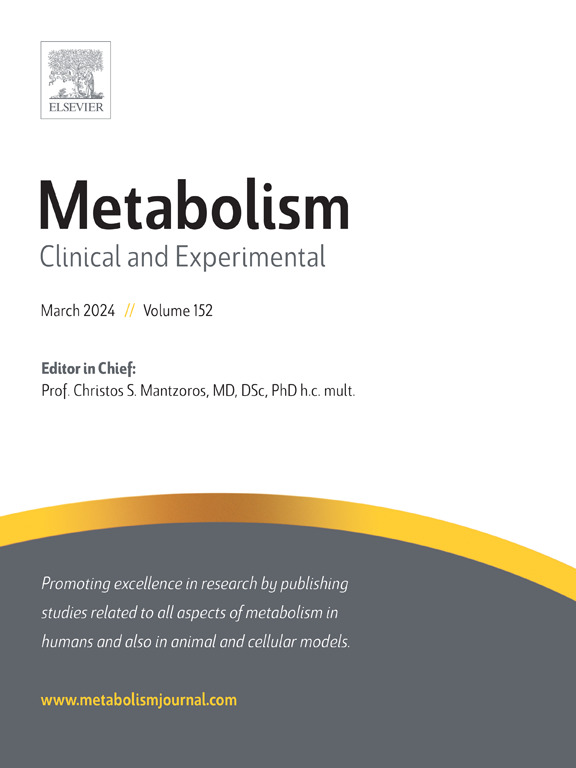Leptin physiology and pathophysiology in energy homeostasis, immune function, neuroendocrine regulation and bone health
IF 10.8
1区 医学
Q1 ENDOCRINOLOGY & METABOLISM
引用次数: 0
Abstract
Since its discovery and over the past thirty years, extensive research has significantly expanded our understanding of leptin and its diverse roles in human physiology, pathophysiology and therapeutics. A prototypical adipokine initially identified for its critical function in appetite regulation and energy homeostasis, leptin has been revealed to also exert profound effects on the hypothalamic-pituitary-gonadal, thyroid, adrenal and growth hormone axis, differentially between animals and humans, as well as in regulating immune function. Beyond these roles, leptin plays a pivotal role in significantly affecting bone health by promoting bone formation and regulating bone metabolism both directly and indirectly through its neuroendocrine actions. The diverse actions of leptin are particularly notable in leptin-deficient animal models and in conditions characterized by low circulating leptin levels, such as lipodystrophies and relative energy deficiency. Conversely, the effectiveness of leptin is attenuated in leptin-sufficient states, such as obesity and other high-adiposity conditions associated with hyperleptinemia and leptin tolerance. This review attempts to consolidate 30 years of leptin research with an emphasis on its physiology and pathophysiology in humans, including its promising therapeutic potential. We discuss preclinical and human studies describing the pathophysiology of energy deficiency across organ systems and the significant role of leptin in regulating neuroendocrine, immune, reproductive and bone health. We finally present past proof of concept clinical trials of leptin administration in leptin-deficient subjects that have demonstrated positive neuroendocrine, reproductive, and bone health outcomes, setting the stage for future phase IIb and III randomized clinical trials in these conditions.

能量平衡、免疫功能、神经内分泌调节和骨骼健康中的瘦素生理学和病理生理学。
自瘦素被发现以来,经过三十多年的广泛研究,我们对瘦素及其在人体生理学、病理生理学和治疗学中的各种作用有了更深入的了解。瘦素是一种典型的脂肪因子,最初因其在食欲调节和能量平衡中的关键功能而被发现,但现在发现它还对下丘脑-垂体-性腺、甲状腺、肾上腺和生长激素轴产生深远影响,在动物和人类之间存在差异,还能调节免疫功能。除了这些作用外,瘦素还通过其神经内分泌作用直接或间接地促进骨形成和调节骨代谢,在显著影响骨骼健康方面发挥着关键作用。瘦素的多种作用在瘦素缺乏的动物模型和循环瘦素水平较低的疾病(如脂肪变性和相对能量缺乏症)中尤为明显。相反,在瘦素充足的状态下,如肥胖和其他与高瘦素血症和瘦素耐受有关的高脂肪状态下,瘦素的作用就会减弱。本综述试图整合 30 年来瘦素研究的成果,重点关注瘦素在人体中的生理和病理生理学作用,包括瘦素的治疗潜力。我们讨论了临床前研究和人体研究,这些研究描述了各器官系统能量缺乏的病理生理学,以及瘦素在调节神经内分泌、免疫、生殖和骨骼健康方面的重要作用。最后,我们介绍了过去在瘦素缺乏的受试者中施用瘦素的概念验证临床试验,这些试验显示了积极的神经内分泌、生殖和骨骼健康结果,为未来在这些条件下进行 IIb 期和 III 期随机临床试验奠定了基础。
本文章由计算机程序翻译,如有差异,请以英文原文为准。
求助全文
约1分钟内获得全文
求助全文
来源期刊

Metabolism: clinical and experimental
医学-内分泌学与代谢
CiteScore
18.90
自引率
3.10%
发文量
310
审稿时长
16 days
期刊介绍:
Metabolism upholds research excellence by disseminating high-quality original research, reviews, editorials, and commentaries covering all facets of human metabolism.
Consideration for publication in Metabolism extends to studies in humans, animal, and cellular models, with a particular emphasis on work demonstrating strong translational potential.
The journal addresses a range of topics, including:
- Energy Expenditure and Obesity
- Metabolic Syndrome, Prediabetes, and Diabetes
- Nutrition, Exercise, and the Environment
- Genetics and Genomics, Proteomics, and Metabolomics
- Carbohydrate, Lipid, and Protein Metabolism
- Endocrinology and Hypertension
- Mineral and Bone Metabolism
- Cardiovascular Diseases and Malignancies
- Inflammation in metabolism and immunometabolism
 求助内容:
求助内容: 应助结果提醒方式:
应助结果提醒方式:


